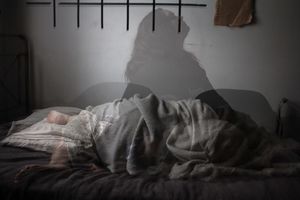Sleep Disorders In Stroke: Difference between revisions
Candace Goh (talk | contribs) No edit summary |
Candace Goh (talk | contribs) No edit summary |
||
| Line 11: | Line 11: | ||
</ref> The presence of these disorders not only affects sleep quality but also exacerbates stroke-related impairments and complicates the rehabilitation process. | </ref> The presence of these disorders not only affects sleep quality but also exacerbates stroke-related impairments and complicates the rehabilitation process. | ||
== | == Underlying Mechanism == | ||
* '''Impact on [[Stroke]] Pathophysiology:''' Sleep disorders, particularly OSA, exert detrimental effects on cerebrovascular health, contributing to endothelial dysfunction, inflammation, and oxidative stress—key factors implicated in stroke pathophysiology.<ref>Gonzalez-Aquines A, Martinez-Roque D, Chavez-Luevanos BE, Guerrero-Campos F, Gongora-Rivera F. [https://neurologia.com/articulo/2019061 Obstructive sleep apnea syndrome and its relationship with ischaemic stroke.] Revista de Neurologia. 2019 Sep 1;69(6):255-60.</ref> Moreover, sleep disturbances disrupt cerebral autoregulation, exacerbate hypoperfusion in ischemic areas, and compromise neuronal repair mechanisms following stroke.<ref>Baillieul S, Dekkers M, Brill AK, Schmidt MH, Detante O, Pépin JL, Tamisier R, Bassetti CL. [https://pubmed.ncbi.nlm.nih.gov/34942140/ Sleep apnoea and ischaemic stroke: current knowledge and future directions.] The Lancet Neurology. 2022 Jan 1;21(1):78-88.</ref> | |||
* '''[[Neuroplasticity After Stroke|Neuroplasticity]] and Recovery:''' Adequate sleep is essential for neuroplasticity, the brain's ability to reorganise and form new connections in response to injury. Disrupted sleep architecture and alterations in sleep-wake cycles impede neuroplastic processes, hinder motor learning, and compromise functional recovery in stroke survivors.<ref>Mensen A, Pigorini A, Facchin L, Schöne C, D'Ambrosio S, Jendoubi J, Jaramillo V, Chiffi K, Eberhard-Moscicka AK, Sarasso S, Adamantidis A. [https://www.sciencedirect.com/science/article/pii/S0165027018304035?via%3Dihub Sleep as a model to understand neuroplasticity and recovery after stroke: observational, perturbational and interventional approaches]. Journal of neuroscience methods. 2019 Feb 1;313:37-43.</ref> | |||
== Resources == | == Resources == | ||
Revision as of 18:10, 30 March 2024
Original Editor - Candace Goh
Top Contributors - Candace Goh
Introduction[edit | edit source]
Sleep disorders represent a common yet often overlooked aspect of stroke care, significantly impacting an individual's physical and cognitive well-being. In stroke rehabilitation, understanding and addressing sleep disorders are crucial for optimising recovery outcomes. Sleep disorders serve significant functions as both a risk element and a determinant in the recovery and prognosis of stroke.[1]
Prevalence of Sleep Disorders in Stroke[edit | edit source]
Sleep disturbances are highly prevalent among stroke survivors, with studies reporting rates ranging from 40% to 72%.[2][3] Females have a higher risk compared to males, as do those with higher stroke severity. Common sleep disorders observed in this population include insomnia, obstructive sleep apnea (OSA), restless legs syndrome (RLS), and sleep-related movement disorders.[4] The presence of these disorders not only affects sleep quality but also exacerbates stroke-related impairments and complicates the rehabilitation process.
Underlying Mechanism[edit | edit source]
- Impact on Stroke Pathophysiology: Sleep disorders, particularly OSA, exert detrimental effects on cerebrovascular health, contributing to endothelial dysfunction, inflammation, and oxidative stress—key factors implicated in stroke pathophysiology.[5] Moreover, sleep disturbances disrupt cerebral autoregulation, exacerbate hypoperfusion in ischemic areas, and compromise neuronal repair mechanisms following stroke.[6]
- Neuroplasticity and Recovery: Adequate sleep is essential for neuroplasticity, the brain's ability to reorganise and form new connections in response to injury. Disrupted sleep architecture and alterations in sleep-wake cycles impede neuroplastic processes, hinder motor learning, and compromise functional recovery in stroke survivors.[7]
Resources[edit | edit source]
- bulleted list
- x
or
- numbered list
- x
References[edit | edit source]
- ↑ Hermann DM, Bassetti CL. Role of sleep-disordered breathing and sleep-wake disturbances for stroke and stroke recovery. Neurology. 2016 Sep 27;87(13):1407-16.
- ↑ Mohandas P, Alomari Z, Arti FN, Alhneif M, Ruiz PA, Ahmed AK, Wei CR, Amin A, Kukreja A, Alrahahleh AA. A Systematic Review and Meta-Analysis on the Identification of Predictors Associated With Insomnia or Sleep Disturbance in Post-stroke Patients. Cureus. 2024 Mar 20;16(3).
- ↑ Hasan F, Gordon C, Wu D, Huang HC, Yuliana LT, Susatia B, Marta OF, Chiu HY. Dynamic prevalence of sleep disorders following stroke or transient ischemic attack. Stroke. 2021.
- ↑ Cai H, Wang XP, Yang GY. Sleep Disorders in Stroke: An Update on Management. Aging and disease. 2021;12(2):570.
- ↑ Gonzalez-Aquines A, Martinez-Roque D, Chavez-Luevanos BE, Guerrero-Campos F, Gongora-Rivera F. Obstructive sleep apnea syndrome and its relationship with ischaemic stroke. Revista de Neurologia. 2019 Sep 1;69(6):255-60.
- ↑ Baillieul S, Dekkers M, Brill AK, Schmidt MH, Detante O, Pépin JL, Tamisier R, Bassetti CL. Sleep apnoea and ischaemic stroke: current knowledge and future directions. The Lancet Neurology. 2022 Jan 1;21(1):78-88.
- ↑ Mensen A, Pigorini A, Facchin L, Schöne C, D'Ambrosio S, Jendoubi J, Jaramillo V, Chiffi K, Eberhard-Moscicka AK, Sarasso S, Adamantidis A. Sleep as a model to understand neuroplasticity and recovery after stroke: observational, perturbational and interventional approaches. Journal of neuroscience methods. 2019 Feb 1;313:37-43.







